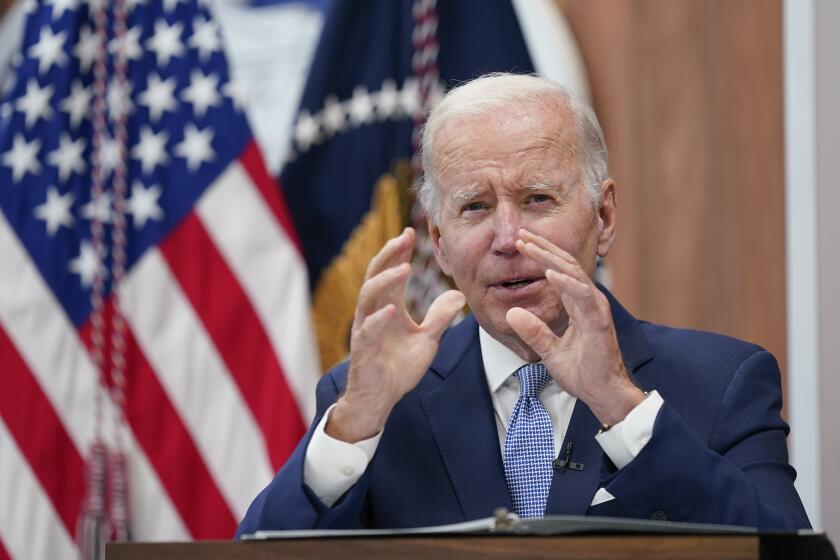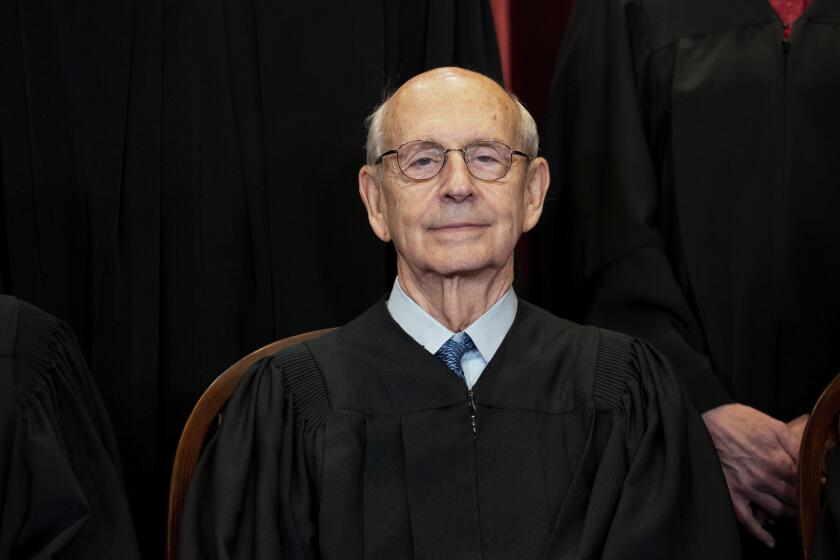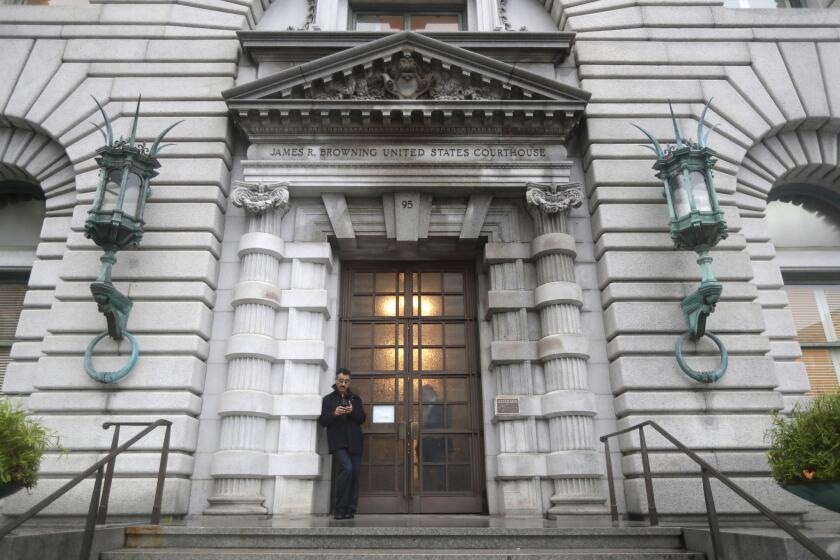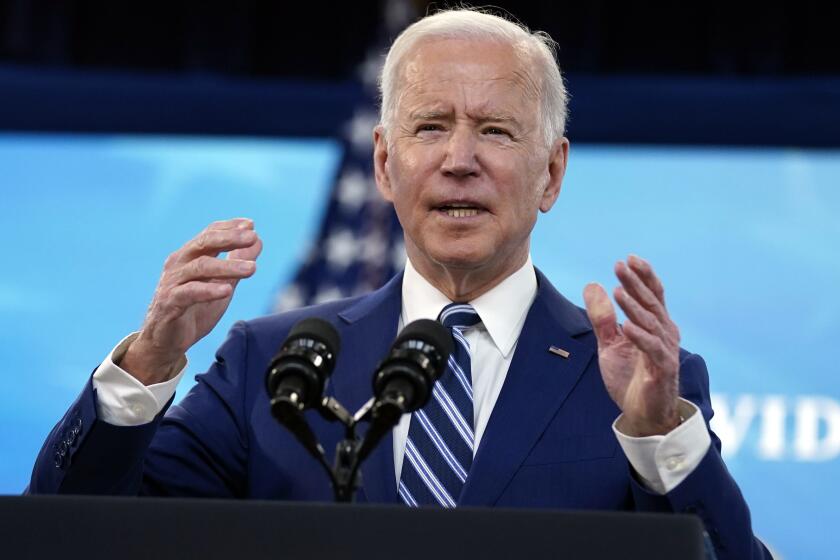Senate confirms 200th federal judge under Biden as Democrats surpass Trump’s pace

- Share via
WASHINGTON — The Senate confirmed the 200th federal judge of President Biden’s tenure Wednesday, about a month earlier than Donald Trump hit that mark in his term, though Trump still holds the edge when it comes to the most impactful confirmations — those to the Supreme Court and the country’s 13 appellate courts.
The march to 200 culminated with the confirmation of Angela Martinez as a district court judge in Arizona. The milestone reflects the importance that Biden, a former chairman of the Senate Judiciary Committee, and Senate Majority Leader Charles E. Schumer (D-N.Y.) placed on judicial confirmations after Trump put his enormous stamp on the federal judiciary with three Supreme Court justices.
“Reaching 200 judges is a major milestone,” Schumer said just before the 66-28 vote. “Simply put, our 200 judges comprise the most diverse slate of judicial nominations under any president in American history.”
The current pace of judicial confirmations for this White House came despite Biden, a Democrat, coming into office in 2021 with far fewer vacancies, particularly in the influential appellate courts, than Trump, a Republican, did in 2017.
The nominees include the first out gay judge, the first Chinese American woman and the second Latina to serve on their respective courts.
“There is more work to do,” Biden said in a statement after the vote. “Going forward, I will continue my solemn responsibility of nominating individuals who have excelled in their professional careers, who reflect the communities they serve and who apply the law impartially and without favoritism.”
It’s unclear whether Biden can eclipse his predecessor’s 234 judges before the year ends, though.
Democrats have solidly backed the president’s judicial nominees, but there have been some cracks in that resolve in recent weeks.
Sen. Joe Manchin III (D-W.Va.) said he would not support nominees who do not have some bipartisan support, and the two Democratic senators from Nevada are opposing a nominee who would be the nation’s first Muslim appellate court judge. They did so after some law enforcement groups came out against the nomination.
The White House is aware of the obstacles as it rushes to outdo Trump’s accomplishment. It’s a high watermark that remains a point of pride for the former president and the senior Republicans who made it happen, including Senate leader Mitch McConnell of Kentucky. Filling dozens of judicial vacancies requires time on the Senate floor calendar, which becomes more scarce as senators in the narrowly divided chamber shift into election-year campaign mode.
Of the more than 40 current judicial vacancies nationwide, half are in states with two Republican senators. That matters because for district court judges, home-state senators still can exercise virtual veto power over a White House’s nominations due to a longstanding Senate tradition.
President Biden’s first batch of judicial nominees come before Congress on Wednesday, including a potential future candidate for the Supreme Court.
White House officials say they have no illusions about the challenges they face but feel reaching 235 is possible. That doesn’t please Republicans.
“Unfortunately, they learned from our example about prioritizing lifetime appointments,” said Sen. John Cornyn (R-Texas).
Meanwhile, liberal advocacy groups are thrilled with the results so far.
“I just cannot rave enough about these judges,” said Jake Faleschini, who leads nominations work at the Alliance for Justice. “It’s been nothing short of transformative of the federal judiciary in terms of both excellence, but also demographic and professional diversity.”
At this stage in his term, Trump had two Supreme Court justices and 51 appellate court judges confirmed to lifetime appointments.
Biden has tapped one Supreme Court justice and 42 appellate court judges. Biden has more confirmations of the district judges who handle civil and criminal cases. Those nominations tend to be less hard-fought.
Biden has emphasized adding more female and minority judges to the federal bench. On that front, 127 of the 200 judges confirmed to the bench during his administration are women. Fifty-eight are Black and 36 are Latino, according to Schumer’s office. Thirty-five judges are Asian American, Native Hawaiian or Pacific Islanders, more than in any other administration, according to the White House.
Older Democratic appointees on the influential federal appeals courts could step aside when Biden assumes office. But if Republicans hold the Senate, they could block more liberal nominees.
In the appellate courts, 30 of the 42 circuit judges confirmed during Biden’s term are women, according to the White House. Thirteen Black women have been chosen as circuit judges, more than all previous administrations combined.
Under Biden, more Latino judges have been confirmed to the appellate courts than during any other administration.
As abortion access remains a vital priority for the Biden administration and a key argument for the president’s reelection bid, the White House also points to several judges with backgrounds on the issue. They include Judge Julie Rikelman of the 1st U.S. Circuit Court of Appeals, who before her nomination argued on behalf of the abortion clinic in Dobbs vs. Jackson, the 2022 ruling that dismantled Roe vs. Wade; and Nicole Berner, a former attorney at Planned Parenthood who now serves on the 4th U.S. Circuit Court of Appeals.
Conservatives say that it’s fine to have diversity, but that it shouldn’t be the focus.
“I think the right standard isn’t trying to check boxes with nominees, but to try to find the men and women who are going to be faithful to the Constitution and the rule of law,” said Carrie Severino, president of JCN, a conservative group that worked to boost support for Trump’s nominees.
Among them are Judge Ketanji Brown Jackson for an appeals court, positioning her to potentially become the first Black female Supreme Court justice.
About a quarter of the judges Trump nominated were women and about 1 in 6 were minorities, according to the Pew Research Center.
Asked about the diversity of Biden’s nominees, GOP senators said there was too much focus on “identity politics.”
“I’m interested in competent lawyers who will administer justice fairly. Now, there are women that can do that. There are men that can do that. There are people of color that can do that,” said Sen. John Kennedy (R-La). “But their primary characteristic that they’re proudest of is racial [identity or gender identity and activism]. And I just don’t think that’s what the American people want to see in their justice system.”
Proponents of diversifying the federal judiciary counter that people who come before the court have more trust in the legal process when they see people who look like them. They said it’s important to diversify judges’ professional backgrounds, too, so more public defenders and those with a civil rights or nonprofit experience are considered.
“The American people deserve federal judges who not only look like America, but understand the American experience from every angle,” said Sen. Richard J. Durbin (D-Ill.), the Senate Judiciary Committee chairman.
Freking and Kim write for the Associated Press.
More to Read
Sign up for Essential California
The most important California stories and recommendations in your inbox every morning.
You may occasionally receive promotional content from the Los Angeles Times.














